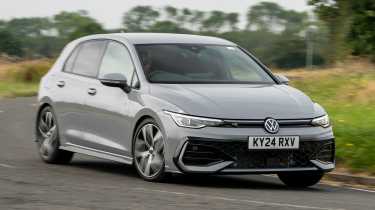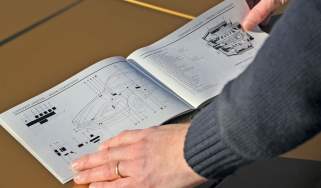What is hire purchase? HP car finance deals explained
Buying a car with a hire purchase deal can be one of the cheapest ways to get into a new car on finance

When buying a new or used car, there are many different ways you can finance your purchase. Hire Purchase, also known as HP, is one of the three most popular ways to get a car on finance, alongside Personal Contract Purchase (PCP) or Personal Contract Hire (PCH).
Hire Purchase (HP) car finance is a type of finance which allows you to spread the cost of buying a car across a contracted period of time. You simply put down a deposit and then pay the remaining cost of the car, plus interest, via a fixed monthly payment until the end of the agreement.
Unlike a Personal Hire Contract agreement (PCH), otherwise known as a lease deal, the car is yours at the end of the Hire Purchase agreement. Unlike a Personal Contract Purchase (PCP) agreement, there’s no need to find a hefty final payment in order to keep the car.
We’ve covered Personal Contract Purchase (PCP) and Personal Contract Hire (PCH) in detail on dedicated pages, so read on below to find out everything you need to know about Hire Purchase car finance agreements.
Did you know you can buy new and used cars through our network of top dealers around the UK? Search for the latest deals…
How does Hire Purchase car finance work?
Hire Purchase (HP) finance deals are calculated by dividing the entire cost of the car plus a fixed rate of interest into a series of monthly instalments, minus any initial deposit.
Hire Purchase agreements are a great way of financing a car if you know you can’t afford to buy it outright and will want to keep it once you reach the end of the agreement.
Hire Purchase plans tend to have higher monthly payments than some alternatives because the monthly payment is calculated on the entire remaining value of the car and the interest outstanding.
With PCP, you only pay off part of the car’s value then have the option of a final balloon payment to keep it. With PCH, you just rent that car, paying off its depreciation, and then hand it back at the end.

HP car finance examples
For example, if you wanted to take out a 48-month long Hire Purchase agreement on a Volkswagen Golf with a £25,500 price tag, you would be paying £534.43 a month for the length of the agreement before taking ownership. This is with a 10,000-mile per year mileage cap, a £5,000 deposit and a rate of interest of 13.1 per cent.
The same car on a Personal Contract Purchase (PCP) agreement would be £337.17 per month, but at the end of the agreement, you would have to fork out a final ‘balloon payment’ of £12,217.50 if you wanted to keep the car. Alternatively, you just hand the keys back and buy a new car.
Advantages and disadvantages of Hire Purchase car finance
Like any other form of car finance, Hire Purchase agreements have different advantages and disadvantages, compared with PCP, Conditional Sale or leasing (PCH) contracts.
Advantages of Hire Purchase agreements
When buying a car, Hire Purchase agreements are often one of the cheapest forms of car finance you can get if you’re planning on buying a car outright. Securing the hire purchase loan against the car helps to keep the monthly payments lower, but if you don't make the payments on time, the car could be repossessed.
Hire Purchase agreements are available through most mainstream car makers and some second-hand dealerships, and are even accessible to buyers with poor credit ratings. This is because the loan is secured against the car, so that acts as collateral to cover the cost of any missed payments.
HP agreements generally have lower payments than for an unsecured personal loan (or you can get a higher grade car for the same outlay). You also don’t need to factor in any hefty final balloon payments similar to the ones you’d find attached to Personal Contract Purchase (PCP) agreements if you decide to keep the car.
HP plans often come with incentives to help get you behind the wheel, a dealer deposit contribution will offer a reasonable discount on this cost, while models that are nearing the end of their production life could even require no deposit to help shift existing stock.
As with unsecured loans, Hire Purchase agreements can be very flexible, and can be set to run over different monthly repayment terms of up to 60 months in many cases. Interest rates are fixed for the duration of the HP agreement, so you'll know how much you'll need to pay back every month, and the deals are usually easy to arrange at a dealership or over the phone.
Once you have made the final payment in your Hire Purchase agreement and paid any outstanding admin fees, you will own the car. These admin fees are much cheaper than the final balloon payments you’d get with a PCP deal.
Disadvantages of Hire Purchase car finance
While it’s true that Hire Purchase agreements often have lower monthly payments compared to unsecured personal loans, Personal Contract Purchase (PCP) agreements generally have cheaper monthly payments as you’re only paying back the expected depreciation on one-third of the vehicle's cost.
The flexibility to spread your monthly repayments over a longer term means you’ll probably be forking out more in interest payments.
Any missed Hire Purchase instalments could mean the car gets repossessed by the finance provider and you damage your credit score in the process. Until you have paid off a third of the amount borrowed, the finance provider can repossess the car without a court order.
If you take out a Hire Purchase agreement, you won’t own the car until you pay the final instalment.

How to get the best hire purchase deal
To get the best deal you should compare several like-for-like hire purchase quotes from different sources.
Use the same deposit and contract length as these can dramatically affect the monthly costs. It’s all about how much you can adjust these factors to make things more affordable.
You might be able to see a £100 to £400 per month difference by just varying the contract terms, so it pays to play with the deal terms. Don’t take a deal as-is from a manufacturer without scrutiny as there might be a headline low price in one area but a higher cost elsewhere.
Beware of APR interest rates
Like other car finance options, Hire Purchase agreements will have a fixed rate of interest attached to them. Look out for the APR (annual percentage rate) as this will include the interest and charges you will be paying over the term of the agreement.
Depending on where you are buying your car from, the interest rate you’ll be paying can widely vary, with some independent brokers charging nearly 20 per cent. If you can’t find the APR rate, just ask the dealer or finance provider as it must be legally stated in a finance agreement.
When manufacturers and dealers advertise a good deal, they often use ‘representative’ APR. This is the rate given to 51 per cent of successful Hire Purchase applications, so keep in mind that you may end up paying significantly more.
Before you jump into a HP plan, most lenders should be able to provide you with an eligibility calculator, giving you an idea of what your acceptance odds and monthly payments could be.
What are the other types of car finance?
The other types of car finance are Personal Contract Purchase (PCP) and Personal Contract Hire (PCH), along with a traditional bank loan.
Personal contract purchase (PCP)
This is a popular type of car finance where you pay a deposit, then a set number of monthly payments before getting a choice: you hand the car back or pay a balloon payment to keep the car.
Personal Contract Hire (PCH)
This is similar to PCP but there’s no option to keep the car at the end. It’s also known as leasing, since it’s essentially a long rental. PCH contracts often include servicing and even car insurance within the monthly payments.
Bank loan
This is where you get a loan from a bank for the cash amount and pay off the car in one go. You then owe money to the bank, usually paid back monthly, rather than the finance company associated with the car seller.
Hire purchase FAQs
Frequently Asked Questions
It completely depends on your personal situation, including how comfortable you are with finance, your monthly outgoings and whether or not you want to own the car at the end of the deal or not. If you’re not sure about that last one, PCP is possibly better as it allows you to choose later, but if you really want to own the car then it might be better to just buy it outright. Hire purchase is aimed at those who want to own but can’t afford to pay the full amount upfront.
Click the links below or on the top left of this page to get full guides on each of the key car finance options…









